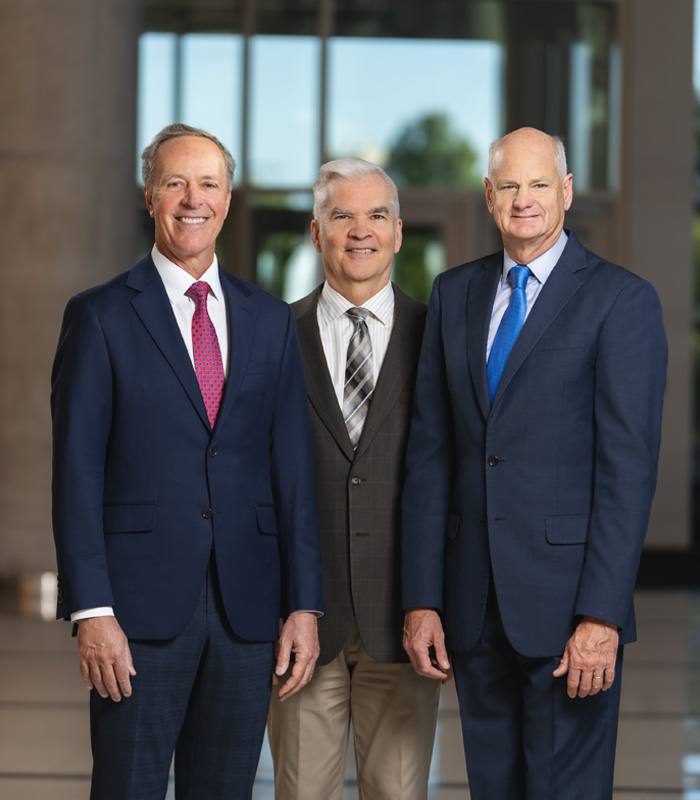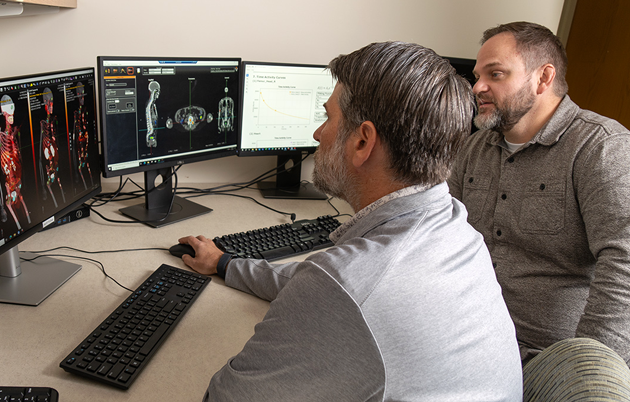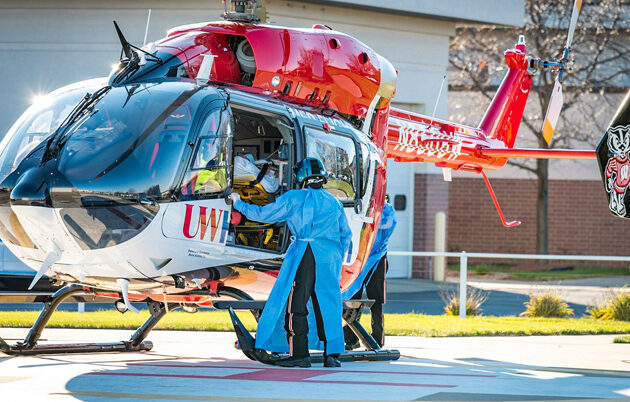Raised in New York, New Hampshire, and Colorado, Harari loved anything relating to the human cell. He earned his medical degree from the University of Virginia and completed an internal medicine internship at the University of California, Davis. There, Harari became intrigued with radiation oncology and developed an interest in head and neck cancers, such as those affecting the voice box, mouth, throat and sinuses.
When it came time to find his first faculty position after his residency at the University of Arizona Medical Center, Harari saw tremendous opportunity at UW–Madison.
“University of Wisconsin–Madison was a spectacular place for a new faculty member to spread their wings,” says Harari, who joined the SMPH faculty in 1990. “One of my first priorities was to establish a multidisciplinary head and neck tumor board. This allows experts from all cancer disciplines — surgery, medical oncology, radiation oncology and others — to thoroughly review each patient’s case before commencing treatment. Rather than viewing cases through a single lens, the board provides expert input from all relevant cancer disciplines to develop the most balanced, state-of-the-art treatment recommendation for the patient. This tumor board remains a central pillar of our head and neck cancer program 34 years later.”
In his research laboratory, Harari became intrigued with combining radiation with various anti-cancer drugs to improve patients’ outcomes. He was a co-leader of the landmark Phase III trial showing a survival benefit for head and neck cancer patients who were treated with radiation and the drug cetuximab. Published in 2006 in the New England Journal of Medicine, the trial remains the most-cited paper in head and neck oncology.
Milestones as Chair
With a growing reputation for his enterprising research and compassionate patient care, Harari was selected in 2007 as chair of the Department of Human Oncology, a position he held until mid-2024. During his tenure as chair, the department reached several milestones, including:
- Doubling the number of faculty members
- Increasing the number of female faculty members from two to 15
- Tripling the amount of federal cancer research support
- Ranking among the nation’s top eight radiation oncology departments in the United States, based on research dollars from the National Institutes of Health (NIH)
- Launching — in 2016, with colleague Deric Wheeler, PhD ’04 — the Badger Challenge, a community-wide bike/run/walk event that has attracted 3,500 participants annually and raised $4.6 million to support research at the UW Carbone Cancer Center
- Championing creation of a UW Health facility for proton beam therapy; scheduled to open in early 2026 in the recently constructed Eastpark Medical Center, the facility will provide unparalleled precision in the delivery of radiation therapy
Harari, who in 2018 served as president of the American Society for Radiation Oncology, also has been the principal investigator for two successive NIH-funded Specialized Program of Research Excellence grants, known as SPORE grants, worth $27 million. These funds have underwritten several translational and clinical trial initiatives designed to achieve improved outcomes for patients with head and neck cancers.
Work-Life Balance
Early in his career, it was not unusual for Harari and his peers to work up to 70 or 80 hours a week. As a husband and father of four, Harari understood the strain this took on his family. When he became chair, he did not want the next generation of faculty physician-scientists to pay such a heavy price for success.
“It is not healthy or sustainable for them to routinely work 80 hours a week,” he says.
It is a clear reflection of Harari’s values that the Department of Human Oncology consistently ranks highly in professional satisfaction and low in professional burnout.
Zachary Morris, MD, PhD (PG ’16), who in 2024 succeeded Harari as chair of the Department of Human Oncology, remembers feeling conflicted about wanting to coach his children’s Little League games.
“I remember feeling sheepish talking about this to Paul at first,” Morris says. “I was grateful when he encouraged me to do these things. That only drove me to work harder because I was not missing out on special times with my kids.”
Colleagues and mentees across the United States are grateful to Harari for his wise, empathetic and generous counsel. Among them, Daphne Haas-Kogan, MD, MBA — chair of radiation oncology at Dana-Farber Cancer Institute, Brigham and Women’s Hospital, Boston Children’s Hospital, and Massachusetts General Hospital, and chief of radiation oncology at Mass General Brigham — never hesitates to reach out to Harari.
“Paul is often the first person I call when I’m struggling with a major career or work-life decision,” Haas-Kogan says. “He will listen carefully, understand my perspective and infuse me with the confidence I needed to make a difficult decision.”
Harari was honored with the American Society for Radiation Oncology’s 2024 Gold Medal Award, the organization’s highest honor, bestowed upon revered members who have made outstanding contributions to radiation oncology.
“Recognition from peers in the field you love is gratifying,” Harari says. “This award reflects my good fortune to have had inspirational mentors and outstanding institutions at which to learn, practice medicine, perform research and gain leadership skills.”
Howard Bailey, MD (PG ’90, ’92)
As a teenager, Bailey did not envision himself becoming the head of anything, much less becoming director of the UW Carbone Cancer Center — one of the nation’s most distinguished academic cancer centers and among the first comprehensive cancer centers funded by the National Cancer Institute (NCI).
A farm kid from Wyndmere, North Dakota (population 450), Bailey is a first-generation college student who did not think about medicine as a career until his first year at the University of North Dakota (UND). In 1981, he was admitted to the UND School of Medicine and Health Sciences, becoming only the second person from his hometown to go to medical school.
“I was not a great student in general, but I enjoyed the sciences and studying the human body,” Bailey recalls.
Before earning his medical degree, Bailey had an epiphany that would chart his professional course for 40 years.
“I remember this elderly patient with a very aggressive cancer,” he says. “Her caregivers were doing everything they could to get her ready for one last car ride so she could see the fall harvest, and the nobility of it all really struck me. This heavily influenced my decision to specialize in oncology.”
After completing an internal medicine residency at Southwestern Michigan Area Health Education Center in Kalamazoo, Bailey says he was thrilled when SMPH took him on as a medical oncology fellow in 1988.
“Typically, pedigree matters, and on paper, I wasn’t much,” he admits. “Some places where I applied hardly gave me the time of day. Coming to UW–Madison was a great opportunity, and this is where my passion for research and patient care blossomed.”


